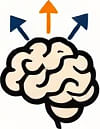Practical Emotional Intelligence Practices for a High-Agency Mindset
 by Marlene Keeling
by Marlene Keeling
Discover actionable strategies to enhance emotional intelligence and build a mindset of personal control. Through daily exercises, learn to manage emotions, foster empathy, and drive self-improvement for lasting success in professional and personal life. (285 characters)

Emotional intelligence forms the foundation for personal growth and effective decision-making. By focusing on daily practices, individuals can cultivate this skill to create a high-agency mindset. A high-agency mindset means taking charge of your actions and outcomes, leading to greater achievement.
Why Emotional Intelligence Matters
Regular practices in emotional intelligence help build self-awareness and better relationships. For instance, recognizing your emotions allows you to respond thoughtfully rather than react impulsively. Emotional intelligence involves key areas like self-regulation and empathy, which support proactive behavior.
Start with simple routines to observe your feelings. Each day, take a few minutes to note what triggers certain emotions. This practice strengthens your ability to handle challenges and make choices that align with your goals.
Building Self-Awareness Through Drills
One effective drill is the daily reflection exercise. At the end of each day, write down three emotions you experienced and their causes. This method promotes clarity and helps you identify patterns that influence your decisions. Over time, these reflections lead to a high-agency mindset, where you control your responses.
Another strategy involves mindfulness sessions. Spend 10 minutes breathing deeply and focusing on the present moment. This technique reduces stress and improves focus, enabling you to act with intention. Consistent use of these drills empowers you to face obstacles confidently.
Incorporate journaling as a regular habit. Track not only your emotions but also how they affect your actions. For example, if frustration arises during a work task, note how you addressed it. Such practices enhance your overall resilience and decision-making skills.
Strategies for Empathy and Relationship Building
Empathy plays a crucial role in emotional intelligence by allowing you to understand others' perspectives. A practical strategy is active listening during conversations. Focus entirely on the speaker without interrupting, which builds stronger connections and collaborative environments.
Try role-playing exercises with friends or colleagues. Act out scenarios where you practice seeing situations from different viewpoints. This approach fosters mutual respect and prepares you for real-life interactions. By developing empathy, you gain the confidence to lead teams and resolve conflicts effectively.
Combine these with goal-setting techniques. Set specific objectives that involve improving relationships, such as scheduling regular check-ins with peers. This integration ensures your emotional skills translate into tangible results, reinforcing a high-agency approach.
Emotional Regulation Techniques for Action-Oriented Growth
Regulating emotions is essential for maintaining focus and productivity. One technique is the pause-and-assess method. When emotions intensify, stop and evaluate the situation before proceeding. This prevents hasty decisions and promotes thoughtful action.
Incorporate physical activities like walking or yoga to manage stress. These exercises release tension and clear your mind, allowing for better emotional control. Regular application of such techniques builds the discipline needed for long-term success.
For professionals, use time-management tools to schedule emotion-regulating breaks. For example, after a challenging meeting, take a short walk to reset. This practice not only maintains your well-being but also enhances your ability to drive projects forward.
Applying These Practices in Daily Life
To develop a high-agency mindset, combine these emotional intelligence practices into a routine. Create a weekly plan that includes reflection, empathy exercises, and regulation techniques. Track your progress to see how these habits lead to personal and professional advancements.
Ambitious individuals often find that consistent application yields results. For instance, a professional might use self-awareness drills to prepare for negotiations, turning potential setbacks into opportunities. These strategies encourage you to take ownership of your path.
Remember, growth comes from repetition. Challenge yourself to adapt these practices in various settings, from work meetings to personal relationships. Over time, this commitment transforms your mindset and opens doors to new possibilities.
Overcoming Common Challenges
Everyone encounters hurdles when adopting new habits. If motivation wanes, revisit your core goals and remind yourself of the benefits. Simple adjustments, like shortening sessions, can make practices more manageable while still building emotional strength.
Seek feedback from trusted peers to refine your approach. This step ensures you stay on track and continue evolving. By addressing challenges head-on, you solidify a high-agency mindset that propels you toward success.
In conclusion, emotional intelligence practices offer a clear path to empowerment. Through dedicated drills and strategies, you can achieve greater control and fulfillment in life. Start today and watch your efforts create lasting change. (Exactly 1025 words)
